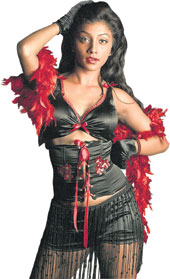 |
 |
| Madhur Bhandarkar on the sets of Traffic Signal with Kunal Khemu and Neetu Chandra; (below) Konkona Sen Sharma in the film |
Madhur Bhandarkar was in town last weekend for an awards function. If the evening saw him winning yet another crown for Corporate, the afternoon found him by the poolside at HHI. He spoke about Traffic Signal, scheduled to release on February 2.
![]() How would you describe Traffic Signal?
How would you describe Traffic Signal?
Traffic Signal completes my trilogy that started with Page 3 and went on with Corporate, films that revolve around the lives of a set group. I wanted to do something different from the elite and urban flavour this time. Thus came the idea of delving deep into the life of the underbelly and bringing in eunuchs, prostitutes, beggars and vendors, who earn their living at the traffic signals. It is very dark, but though the texture of the film is real, there is a grim humour, that I imbibed from these people. They live a difficult life and have learnt to laugh at it.
![]() How did you get the idea of Traffic Signal?
How did you get the idea of Traffic Signal?
For many years now, I am in the habit of walking from my house to the Siddhivinayak temple in Mumbai. While walking, I would observe these people at the traffic signals. For those in the car, the signal is a few minutes break, but for these people it means business. I was amazed with the activity, the speed with which they did their work as soon as the signal turned red... It took me six months of research.
![]() Your films have very strong women protagonists. Not so with Traffic Signal...
Your films have very strong women protagonists. Not so with Traffic Signal...
I felt that in Page 3 or in Corporate, or even in Satta, the women narrated my story better. They are all strong characters, but they have this vulnerability that has brought out the fragility in the script. I have been completely in love with my women characters, whether it be Mumtaz in Chandni Bar or Madhvi in Page 3… Traffic Signal, however, has a strong male protagonist in Kunal Khemu.
![]() You are working with Konkona Sen Sharma for the second time in Traffic Signal…
You are working with Konkona Sen Sharma for the second time in Traffic Signal…
It was a challenge for me. In Page 3, the sensibility was very different. Here, I wanted to break that mould and cast her as a prostitute. Initially, she agreed, but when she went into the details of the character, she thought her to be too loud. She wasn’t sure she would be able to do it justice and wanted to back off. But I insisted. I would act out the character for her and ask her to copy me, and she does that very well (smiles). I am very satisfied with the way Noorie has come alive.
![]() First Konkona… then Bipasha. How was it working with the Bengali girls?
First Konkona… then Bipasha. How was it working with the Bengali girls?
They are both wonderful actors in their own right. Both have very different appeals, but there is place for both in the industry. People say that I introduced Konkona to Bollywood. Similarly Bipasha was taken for just a glamourous actress before Corporate. Now, she is getting a variety of roles. I am very happy for both.
![]() So who will be the third Bengali actress for you?
So who will be the third Bengali actress for you?
I don’t know yet. I am sure to make a hat-trick (laughs)... I have a very good relationship with Calcutta. My films are very well received here and I respect the city’s cultural sensibility. As a film-maker I have always respected Satyajit Ray, Mrinal Sen and Ritwik Ghatak.
![]() Page 3 got a phenomenal response. Compared to that Corporate did lukewarm business. What are your expectations from Traffic Signal?
Page 3 got a phenomenal response. Compared to that Corporate did lukewarm business. What are your expectations from Traffic Signal?
As a director I never have any expectations. The audience must judge. But we must remember one thing, Corporate was meant for a niche audience, it was a film for the metro and multiplex audience, and it did very well there. People in the interiors wouldn’t identify with it.
![]() The industry does offer a director more space today...
The industry does offer a director more space today...
That’s because of the corporatisation of the industry. Today Madhur Bhandarkar is a brand.










